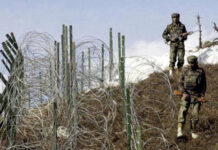SRINAGAR: In a gripping twist of events, the highly debated revocation of Article 370 in 2019 has once again ignited a storm in Srinagar. Chief Justice of India (CJI), DY Chandrachud, found himself at the center of this maelstrom as he presided over the 19th All India Meet of the Legal Services Authorities. A multitude of pleas contesting the abrogation currently await a verdict from the Supreme Court.
Jammu and Kashmir Lieutenant Governor Manoj Sinha, who addressed the legal gathering, lauded the Centre’s decision to discard the special constitutional position of J&K since 1947. He hailed the abolition of Articles 370 and 35A as a transformative step that ushered in an era of historic reforms and boundless opportunities for the people of J&K. Sinha particularly emphasized the positive impact on individuals from marginalized backgrounds who had long been deprived of the benefits provided by laws enacted by the Parliament. Reflecting on the past four years, he proudly described them as a period synonymous with peace, progress, and prosperity, highlighting the international recognition of J&K’s capabilities and socio-economic growth at the recent G20 meeting.
“Laudable measures have been taken to empower farmers and landowners by issuing land passbooks in three languages. Transparent and accountable governance has ensured that development benefits reach all sections and areas, bringing victims of unbalanced progress into the mainstream of development,” he added.
In stark contrast to Sinha’s viewpoint, former J&K chief minister and People’s Democratic Party president, Mehbooba Mufti, took to Twitter to vehemently express her dissent. She drew the attention of the CJI, highlighting what she perceived as the “illegal revocation” of Article 370.
“Welcome CJI to Kashmir. Article 370, a constitutional commitment of this nation to the people of J&K, was illegally revoked. This is despite earlier Supreme Court rulings against its abrogation. It has been four years, and yet the matter is still pending before the honorable court,” Ms Mufti said.
She pointed out that thousands of young individuals were languishing behind bars without the opportunity for a fair trial. “The process itself has become the punishment. J&K acceded to India out of choice, not compulsion. So why is it being deprived of the basic fundamental rights and guarantees provided by the constitution itself? I earnestly hope that your presence sheds light on these pressing issues,” added Mufti.
In his speech, the Chief Justice refrained from addressing the issue pending in his court. Instead, he underscored the importance of reaching out to marginalised individuals. “Many prisoners belong to underprivileged and marginalized sections. We must ensure that they receive the necessary legal aid and services during their trials,” he stressed.
According to CJI Chandrachud, for people to trust legal aid, it must demonstrate competence and the desired quality. “We need to enhance the capabilities of lawyers and para-legal volunteers and encourage them to unlearn their social biases,” he added. He also urged legal services institutions to promote the participation of more women and transgender individuals as lawyers and para-legal volunteers.
Union Law Minister Arjun Ram Meghwal commended the Indian Legal Services Authorities, stating, “The services provided by the Indian Legal Services Authorities are commendable. The upcoming government’s goal should be to ensure economic and social equality for every citizen. Delivering justice to everyone will automatically lead to social and economic equality,” Mr. Meghwal expressed during the National Legal Services Authority (NALSA) meeting.
The two-day event is being hosted by the government of J&K and the Jammu & Kashmir Legal Services Authority. It has attracted the presence of Chief Justices of High Courts, executive chairpersons of State Legal Services Authorities, and chairpersons of High Court Legal Services Committees, among other notable attendees.















